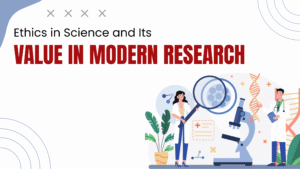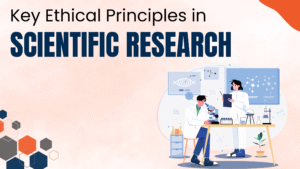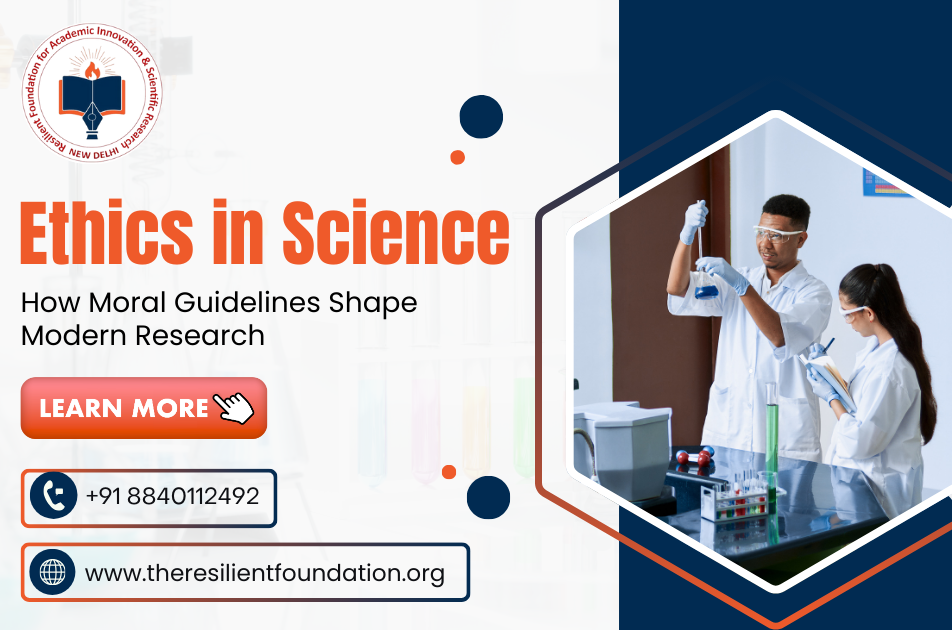Science has always been about exploring new ideas, but it cannot grow without responsibility. That’s why ethics in science plays such an important role in modern research. Researchers conduct studies honestly, safely, and with respect for both people and the environment. When researchers follow the right rules, society benefits from results that are not only useful but also trustworthy.
Ethics in Science and Its Value in Modern Research
Ethics in research is not only about following rules, but also about creating trust. Because of that, it helps both researchers and the public believe in the outcomes. The value of ethical science can be seen in many ways:

- Protecting participants: In clinical research ethics, volunteers are given clear information, their safety is prioritised, and their consent is respected.
- Building credibility: Studies done with honesty create confidence in results, making them more accepted worldwide.
- Preventing harm: Ethical checks reduce risks to humans, animals, and the environment.
- Encouraging fairness: By treating all participants equally, ethical research ensures no group is left behind.
- Supporting progress: With strong guidelines, science can advance faster because fewer mistakes and disputes happen.
So, we can say that science becomes stronger when ethics leads the way.
Key Ethical Principles in Scientific Research
Ethical principles act like a moral compass for scientists. They are clear, simple, and necessary. Also, every project must follow them to ensure fairness and safety. Some of the main ones include:

- Honesty and integrity: Researchers must tell the truth about results, methods, and data. Programs like a bioethics training program also support this.
- Informed consent: Every participant must know what they are signing up for before joining a study.
- Privacy and confidentiality: Personal details must always be protected.
- Not harm: Studies must reduce risks as much as possible, whether on people, animals, or the planet.
- Transparency: Sharing methods and results openly allows others to verify findings.
If these principles are followed, scientific research becomes more reliable and helpful to society.
Ethics and Modern Technology in Research
Technology has changed the way science is done, but ethical concerns remain just as strong. Because of that, new questions arise with each innovation. Here are some ways ethics meets modern research technology:
- AI in research: Machines can analyse large amounts of data, but researchers must ensure fair use. This is where research ethics certification programs provide proper guidance.
- Genetic studies: With tools like CRISPR, scientists can edit genes, but guidelines ensure these powers are not misused.
- Digital health records: Data storage helps doctors and patients, but privacy rules must protect sensitive details.
- Robotics and automation: Robots can assist in surgeries and labs, but responsibility still lies with humans.
- Big data and analytics: Huge data sets can improve science, but they must be handled without bias or misuse.
So, as technology grows, ethics must grow along with it to keep research safe and fair.
Myths and Facts About Ethics in Science
There are many misunderstandings about research ethics, but facts tell a different story. Two of the most common myths are:
- Myth 1: Ethics slows down research
- Fact: With a proper bioethics certification, studies actually run smoother because approvals are faster when rules are followed.
- Myth 2: Ethics is only about paperwork
- Fact: Ethics is about people’s safety, trust, and fairness. Paperwork is only a tool to track and prove these values.
So, instead of being a burden, ethics actually makes research stronger and more effective.
How Ethical Guidelines Shape Research Outcomes
Ethical rules are not just background formalities. They directly shape how science delivers results. If researchers follow them, outcomes are stronger, fairer, and more impactful. Here’s how they help:
- Better trust from society: People support projects because they know researchers respect ethics in science.
- High-quality results: Strong ethical checks make results reliable and accepted worldwide.
- Stronger institutions: Organisations like Resilient Foundation help promote ethical practices by providing awareness, support, and structured learning through initiatives like a bioethics training program.
- Career growth: Scientists gain more credibility when they complete recognised programs, such as research ethics certification.
- Certification: With certifications like bioethics certification, research becomes easier to share across borders.
At Resilient Foundation, we believe that science must move forward with responsibility. That’s why we support ethical awareness and programs that guide researchers. Because of that, the foundation is helping create a future where research benefits everyone safely and fairly.

